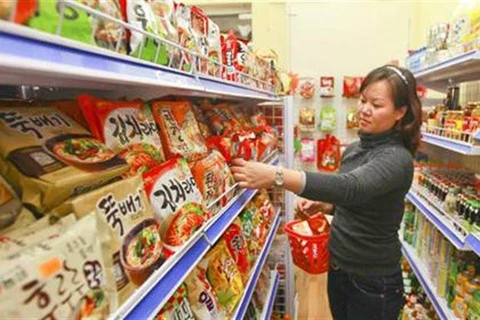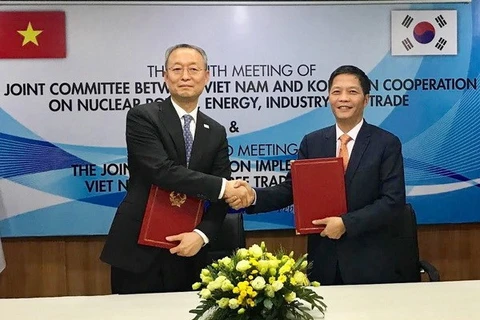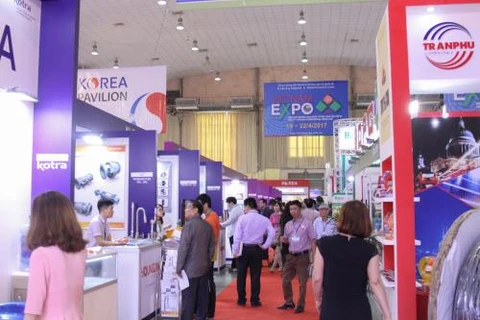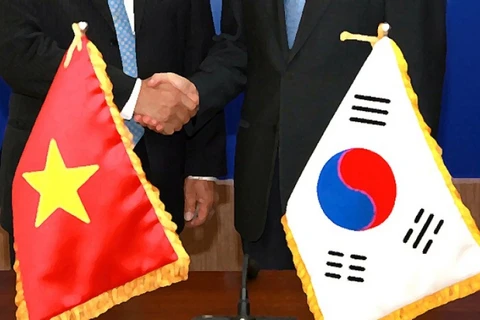HCM City (VNA) – The enforcement of the Vietnam-Korea Free Trade Agreement (VKFTA) has been bringing new opportunities to businesses of both nations, but the number of Vietnamese firms capitalising on the deal is lower than expected.
The view was shared by experts at a seminar co-hosted by the Vietnamese Ministry of Industry and Trade (MOIT)’s Department of Asia and Africa Markets and the Korea Trade-Investment Promotion Agency (KOTRA) in Ho Chi Minh City on May 10.
Le An Hai, Deputy Director of the Vietnamese Ministry of Industry and Trade (MOIT)’s Department of Asia and Africa Markets, said the VKFTA, which took effect since late 2015, has helped bilateral trade and investment grow by 13-30 percent per year.
Two-way trade reached a record high of 61.5 billion USD in 2017, he said, adding that Vietnam’s exports to the Republic of Korea (RoK) has witnessed higher growth than its imports from the East Asian country.
Sungho Ahn, a representative from the Korean Ministry of Trade, Industry and Energy, said since the VKFTA came into force, the RoK’s major groups such as Samsung, LG and Doosan have expanded investment in Vietnam.
By the end of 2017, the RoK had invested 57.6 billion USD in more than 6,500 projects in Vietnam, making it the biggest foreign investor in the Southeast Asian country, he said.
The Korean projects mainly focused on manufacturing industry and production for export, thus creating a momentum for the two nations to achieve the target of 100 billion USD in bilateral trade by 2020, the official added.
However, experts said the RoK’s FDI enterprises have higher export value and better taken advantage of the VKFTA as domestic firms have just got access to the supply chain and preferential aspects of the deal.
Therefore, they suggested Vietnamese enterprises take the initiative in getting information about the VKFTA as well as other FTAs that Vietnam has signed to choose their own incentives.
Domestic businesses should also renovate their technologies and develop products in conformity with the market’s demand, the experts said.-VNA
The view was shared by experts at a seminar co-hosted by the Vietnamese Ministry of Industry and Trade (MOIT)’s Department of Asia and Africa Markets and the Korea Trade-Investment Promotion Agency (KOTRA) in Ho Chi Minh City on May 10.
Le An Hai, Deputy Director of the Vietnamese Ministry of Industry and Trade (MOIT)’s Department of Asia and Africa Markets, said the VKFTA, which took effect since late 2015, has helped bilateral trade and investment grow by 13-30 percent per year.
Two-way trade reached a record high of 61.5 billion USD in 2017, he said, adding that Vietnam’s exports to the Republic of Korea (RoK) has witnessed higher growth than its imports from the East Asian country.
Sungho Ahn, a representative from the Korean Ministry of Trade, Industry and Energy, said since the VKFTA came into force, the RoK’s major groups such as Samsung, LG and Doosan have expanded investment in Vietnam.
By the end of 2017, the RoK had invested 57.6 billion USD in more than 6,500 projects in Vietnam, making it the biggest foreign investor in the Southeast Asian country, he said.
The Korean projects mainly focused on manufacturing industry and production for export, thus creating a momentum for the two nations to achieve the target of 100 billion USD in bilateral trade by 2020, the official added.
However, experts said the RoK’s FDI enterprises have higher export value and better taken advantage of the VKFTA as domestic firms have just got access to the supply chain and preferential aspects of the deal.
Therefore, they suggested Vietnamese enterprises take the initiative in getting information about the VKFTA as well as other FTAs that Vietnam has signed to choose their own incentives.
Domestic businesses should also renovate their technologies and develop products in conformity with the market’s demand, the experts said.-VNA
VNA
























